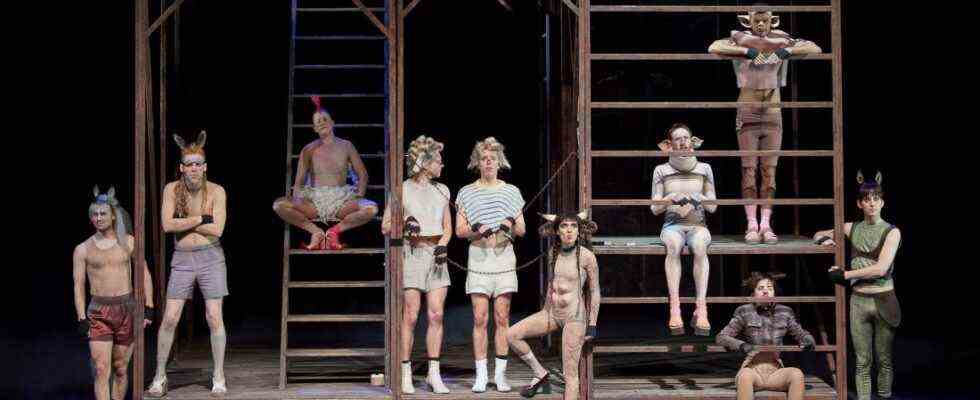The Munich Volkstheater is now familiar with animals. On the opening weekend in the new house, the actors appeared in “Our Flesh, Our Blood” as a cow, goat, pig, horse and dog. In keeping with the move into the new district, it was all about cattle for slaughter. In his production of “Über Menschen” director and artistic director Christian Stückl has a real dog come onto the stage several times. And now: “Animal Farm” after George Orwell. It is in the nature of things that the actors will portray animals here. Director Sapir Heller also includes a real dog in her production, a concentrated dose, so to speak. And so the evening begins with a dog running onto the stage, accompanied by a voice from the off, delighted murmuring from the audience, especially when there are treats. yes mei A very heartfelt introduction to the dark, otherwise so imaginatively told story.
George Orwell’s fable “Animal Farm” was published in 1945, conceived as an anti-Stalinist satire. The socialist Orwell tells in ten chapters about a revolution of the animals who want to abolish the rule of the farmer Mr. Jones. The vision of a life in which everyone is equal is initially conceived by the old pig, Old Major, who dies shortly thereafter. The overthrow comes anyway, but little by little the pigs take over and set up a dictatorship. In the end, only one principle applies: “All animals are equal, but some animals are more equal than others.” With Orwell, the eradication of the postulate of equality and the renewed subjugation of most animals is a gradual process. The noose is slowly placed around the neck and is gently tightened without resistance.
A magnificent show running establishes the characters
At the beginning of Heller’s production, which can be shown in front of a 75 percent full hall, Philipp Lind talks from the off – while the dog is collecting the treats on the ramp – about the initial situation on the farm. Farmer Jones would rather get drunk than run the business. After this introduction, the evening begins a second time with the appearance of the animals. Henriette Nagel is the first to come onto the stage, the center of which is dominated by a rust-colored metal structure (stage and costumes: Anna van Leen). Nagel wears a comb on his head, a beaked nose, and a feather skirt. She lets her head twitch forward, takes her arms back, her chest out, and runs around in a panic from time to time. Without a doubt: a chicken. One after the other, the animals come into the light, with simple set pieces on the costume and absolutely successful movement choreography. Proud horses, stupid sheep, naive cows, grumpy donkeys, bright pigs. It’s a splendid show and an entertaining established character setting. A fairy tale start.
Old Major soon talks about his vision from the scaffolding, below Cow Marie (Maral Keshavarz) widens her eyes as if this were conducive to spiritual rays of hope. The sheep (Julian Gutmann and Silas Breiding) do without any perspective, the horse Boxer (Jan Meeno Jürgens) prefers his sportiness anyway. Your lack of understanding weighs heavily on the result: Revolution: yes, please. But what is it really? It still comes with a shower of confetti, beats and a hip-hop-jazz-dance interlude. The animals are free, now what?
Together you may be less alone, but you don’t always agree. In “Animal Farm” the pigs finally prevailed.
(Photo: Judith Buss)
It is the strength of Heller’s staging that she invents many beautiful details, cleverly scatters the characters across the stage or pulls them together. The way she uses the divisible stage scaffolding as a play element is also a nice trick, the animals work their way through the pushing back and forth, their drudgery is made visible in this way. The character drawings are also fine: Jakob Immervoll wears a wonderful donkey grant, Lorenz Hochhuth the elegance of a horse. Jonathan Müller as the creepy pig demagogue, Steffen Link as the intellectual opposite and finally Anne Stein as the unscrupulous, dangerous leader are convincing.
Nevertheless, the evening needs some time to develop. That has to do with the cute beginning, but also with the miserable situation, only briefly hinted at by the dog narrator, from which the animals free themselves. While the farm dwellers are tinkering with their ideal of equality, their sunshine state doesn’t seem seriously threatened, that remains pale stage claims. The new nation arranges itself strangely without conflict. The changes that Orwell was able to note down in subtle nuances only really become tangible on stage over time, but then the regime of terror is suddenly there.
It has often been told from the stage how manipulative and dangerous words are, how agonizing oppression, how inexplicable the shock of those who allow themselves to be subjugated. Heller picks up the threads and finds her own soft voice to unravel it again and pose the new question of equality and equality. There it is very close to Orwell’s skilfully carefree fairy tale tone, which is set in contrapuntal to the content. Both dab a battle painting onto the canvas in the most beautiful pastel colors. You just have to look. The fact that Heller has to have a dog run over it again at the end: it’s a gift.

